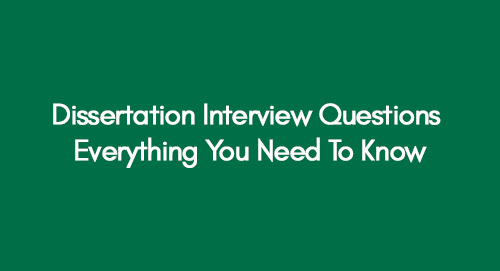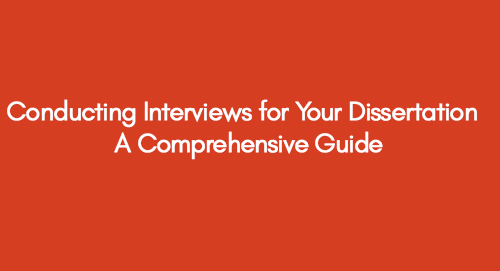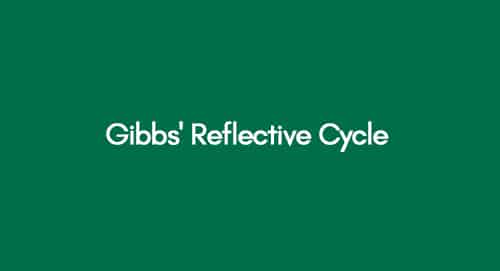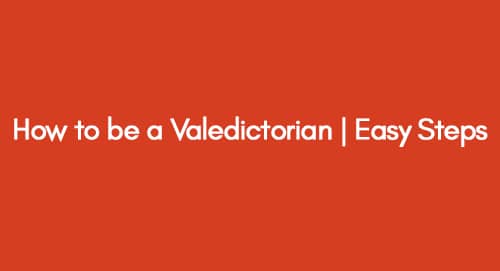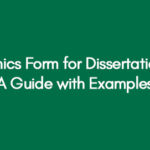
Ethics Form for Dissertation | A Guide with Examples
August 28, 2024Post-colonial Spain: Navigating Historical and Political Complexities within cultural institutions In Catalonia and Andalucía
February 14, 2025The dissertation interview questions are designed to acquire detailed information, knowledge, and perspectives of the individuals or groups taking part in the dissertation research process. Interviewing dissertation research is one of the most important activities in collecting detailed insights and rich qualitative data. The success of interviews depends on the quality of questions, which are essential for gathering meaningful responses that are essential for your research objectives.
Review a Comprehensive Guide on Conducting Interviews for Your Dissertation
This dissertation interview guide will help you understand the role of interview questions, explore their types, and craft effective questions for your dissertation, ensuring you collect the data needed to answer your research questions with practical examples.
Understanding the Role of Interview Questions in Your Dissertation
Interview questions are essential for delving deep into your research topic by exploring the experiences and perspectives of your participants. The questions you ask depend on your research design, study nature, and the data you need to collect.
Key Considerations
- Research Objectives: Your interview questions are supposed to focus on the main purpose of your study. They should be designed to assist you in answering the core research questions.
- Type of Interview: Whether you’re conducting structured, semi-structured, or unstructured interviews will influence the format and flexibility of your questions.
- Participant Expertise: Tailor your questions to the knowledge and experience of your participants to ensure you gather relevant and insightful information.
Types of Interview Questions
By knowing the different types of interview questions, you will ensure that you cover all aspects of your research.
Open-ended Questions
Open-ended questions make respondents think and explain their views in greater detail. These types of questions are good for examining complicated matters and looking for ways to better understand them.
Example
“Please tell me about your interaction with remote work and how this has influenced the level of productivity.”
Purpose
To enhance the quality of the data collected by permitting the participants to express themselves in their own language and perspective.
Closed-Ended Questions
Closed-ended questions expect a yes or a no or some options from the respondent. These may not be as comprehensive however they are useful when trying to get specific pieces of information or when applied in structured interviews.
Example
“Do you believe you have become more productive due to working remotely?”
Purpose
To obtain clear, precise data that is easy to measure or classify.
Probing Questions
Probing questions are follow-up questions that require the participants to provide or elaborate on their previous answers. Probing questions aim at clearing the answers given and defining the topics more thoroughly than in the previous responses.
Example
"Please explain how remote work suits your communication with your colleagues now better than in the past."
Purpose
To find out more with reference to a specific answer provided by a participant previously.
Behavioral Questions
Behavioral questions require the participant to describe how they handled specific situations in the past. These are useful in understanding real-life applications and behaviors related to the research topic.
Example
"Could you provide an example of a challenge you faced while working remotely, and what strategies you used to overcome it?"
Purpose
It captures how participants apply their abilities and knowledge in real-world situations to provide practical information about their experiences.
Hypothetical Questions
Hypothetical questions ask participants to imagine a situation and describe how they might react. These are useful for investigating action possibilities as well as the dynamics behind choice processes.
Example
"If your company decided to revert to office-based work, how would you think it would affect your productivity?"
Purpose
To assess how participants might react to future scenarios, providing insights into their expectations and concerns.
Leading Questions (Use with Caution)
Leading questions suggest an answer or indicate a required answer to the participant. Generally, they should be avoided, yet sometimes it is necessary for validating particular information.
Example
"Don't you think that working from home made it more difficult to separate work from personal life?"
Purpose
These are used to guide the respondents to a line of thought, though they should not be overused to avoid response bias.
How to Write Interview Questions for Dissertation
When writing interview questions for dissertation research, you need to reflect on your research questions, the type of data you would like to collect, and the appropriate ethical issues. Your questions must adhere to the ethical guidelines outlined in your dissertation's ethics form to help you protect your participants' rights and confidentiality. Here are some tips to help you create good questions;
Start with Broad Questions
Start off with general, open types of questions that get the respondents comfortable in the interview and can offer some background contextual material. These can also serve sometimes as a foundation for more specific follow-up questions:.
Example
"How has your experience with working remotely been so far?
Avoid Leading or Biased Questions
Questions that suggest a particular answer can impact the responses of participants, thereby potentially distorting your data. In contrast, it is advisable to formulate neutral inquiries that enable participants to articulate their authentic opinions and experiences.
Example
Replace "Don’t you think remote work is more stressful?" with "How has remote work affected your stress levels?"
Probing Questions to Explore Responses
When a respondent offers an intriguing or ambiguous reply, it is advisable to employ probing inquiries to delve deeper into their response. This methodology facilitates the acquisition of more comprehensive and refined information.
Example
"Could you elaborate on what you mean by 'challenging'? Which specific aspects of remote work have been problematic for you?
Keep Questions Clear and Concise
Avoid questions that are too long or complicated because those could confuse respondents or lead to ambiguous responses. Make certain that every question is straightforward and easily understood.
Example
Instead of asking, "How do you feel remote work has influenced your productivity, work-life balance, and overall job satisfaction?" break it down into separate, focused questions.
Pilot Your Questions
Before running your actual interviews, you should pilot your questions with a friend or family member to identify any potential issues or ambiguities. This step will help you to refine your questions and maximize the clarity of your interview.
Example
After piloting, you might realize that some questions are too vague or that participants need more context to provide meaningful answers.
Dissertation Interview Questions Examples
Following is a sample interview questions for dissertation of qualitative research questions that might relate to your dissertation on remote work and its effect on people's productivity;
Opening Question
"How would you describe to me your remote work experience so far?"
Productivity
"What is the impact that remote work has had on your daily productivity?"
"What have been the enabling factors that brought a change in your productivity?"
Work-Life Balance
"Has remote work affected your work-life balance?"
"If yes, how?"
"What strategies have you used to maintain boundaries between work life and personal life?”
Communication
"How has working from home changed your communications with colleagues?"
"Have you encountered any communication problems while working remotely?"
Job Satisfaction
"How does this impact your feelings about your job in general?"
"Do you feel more or less satisfied with your job since you started working remotely?"
Closing Question
"Is there anything else you'd like to add regarding your feelings about working remotely?"
Analysing and Using the Data
After conducting the interviews, your next step would be data analysis. Transcribe the interviews and then begin coding the responses in themes, patterns, and insights that emerge from the data. These then form the basis of your analysis throughout the dissertation and help you answer your research questions.
- Thematic Analysis: Group similar responses together to identify common themes.
- Quotes and Evidence: Utilize direct quotes from participants to illustrate salient points in your dissertation.
- Comparative Analysis: Comparison among responses from diverse participants in order to observe similarities and differences.
Conclusion
Crafting effective interview questions for thesis is a critical step in conducting meaningful qualitative research. By carefully designing your questions, you can gather rich, insightful data that will enhance the depth and rigour of your dissertation. Remember to pilot your questions, remain flexible during the interview process, and always keep your research objectives in focus. With well-crafted questions, you’ll be well-equipped to conduct successful interviews that contribute significantly to your dissertation.
Get an Immediate Response
Discuss your custom requirements with our writers
Free Online Plagiarism Checker For Students
We will email you the report within 24 hours.
Upload your file for free plagiarism


















